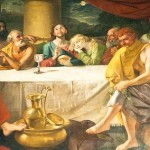 Luke 18:15-30
Luke 18:15-30
This morning I feel as if I am at a Chinese food buffet but have been told I may only eat from one dish. I love the 1928 Prayer Book lectionary because the Daily Bread offering is just right to feed me. And yet this morning there are 3 sections (pericopes) – and they are all delicious and nourishing!
It is the father – and child – in me that feels compelled to meditate on verses 15-17. What a delightful picture these verses present of our Lord! Most of the time Jesus spends around adults, though a surprising amount of this adult time is spent around sinners. But why wouldn’t Jesus love children?! He’s not one of those unmarried men who don’t feel comfortable around children, and what’s more amazing to His disciples is that far from seeing children as a bother or intrusion, He sees them as a picture of His disciples. Only the disciples can’t see this (Jesus loves irony.)
There are a lot of things we adults can learn from children. We learn, for example, that they are often dirty, unruly, uncivilized, tempestuous and almost always loud. Whether trying to hear what the Master is saying or just trying to catch their breath from the hard life of a disciple, the disciples don’t want to have to put up with children.
Surrounded by 6 of my own children, as well as others, sometimes I don’t either. But several things about Jesus amaze me here. One of these is that, despite the fact that Jesus often went without enough sleep, wore Himself out by preaching and healing, and sometimes was so hemmed in by the crowd that He couldn’t eat, He doesn’t tell the kids to scram.
The fact is these aren’t just any kids: they’re infants. They are the smallest of humans, the ones who cannot even understand who Jesus is – and they are the ones that He tells the disciples to bring to Him.
We all know that our culture doesn’t treasure children the way we should, but sometimes the Church is guilty of this as well. We don’t baptize our infants or children because they couldn’t possibly understand what is happening to them. We don’t let them in the worship service because they might distract us adults, and when they get older we think the best place for them is by themselves in a youth group, safely away from the adults.
Jesus thought and acted differently. He rebuked His disciples for not bringing the infants to Him. Even more, He said that of such is the kingdom of heaven. He was right, of course, because entrance into the kingdom of heaven is not by the will of man but by the will of God. We who were dead in our sins could not love God first, so He initiated a relationship through love and elected us. It’s not what we do that is most important: it’s what God says and does. And Jesus says that infants belong in His kingdom, just as they did in the Old Covenant. It would be amazing if God allowed infants in His kingdom in the Old, inferior, Covenant, and then suddenly turned Scrooge and barred them from His kingdom in the New and perfect Covenant.
The final startling revelation is not only that infants belong in God’s kingdom: it’s that we are to be like those infants. Just as we can’t literally be born again and get inside our mother’s wombs (for which mothers everywhere are eternally grateful), we can’t literally be made infants again. But we can understand that we should enter God’s kingdom as infants do. That means that we understand that it is God who brings us into His covenant: it is not something we can do for ourselves. It means that we are always to be aware of how helpless and humble we are before God Almighty.
And it means that even though we, like kids, are often dirty, unruly, uncivilized, tempestuous, and loud, that God desires us to come to Him. We come, in spite of all of this, because like children who instinctively trust the adults around them we should instinctively trust the only one we can perfectly trust. We come, because there is a trustworthy, loving Person who has called us to Himself. Like children, too, we usually need others, more mature than us, to lead us to Jesus, the lover of children.
So come as a child to Jesus, the lover of children. Come before Him as a child, for of such is the kingdom of heaven.
Point for Meditation:
- What would it mean for me to come to God like a little child? How might I do this today?
- How might I be more accepting of children in the church and even actively help to disciple these little ones?
Resolution/Prayer: Lord, thank you for allowing me, a mere child before You, to come to You. Thank you that despite my ignorance, helplessness, and unruliness, that you still bid me to come. Help me, Lord, to come to you today as a child, not thinking about myself, but simply trusting in You.
© 2015 Fr. Charles Erlandson















